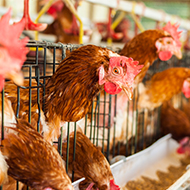UK enters bluetongue seasonally low vector period
Colder temperatures have resulted in reduced midge activity.
The chief veterinary officer (CVO) has announced that the UK has entered a seasonally low vector period for bluetongue virus.
Restricted Zones will stay in place in affected regions as a precautionary measure while the farming industry considers its next steps, however some restrictions will be eased.
The low vector period is the result of colder temperatures across the UK, which is reducing midge activity. This means that midges are not actively feeding, which results in a lower risk of new infections from biting midges.
Animals which are moving out of a Restricted Zone will still require a pre-movement test, unless they are going directly to slaughter or a dedicated slaughter market.
However there will no longer be a requirement for post-movement tests when an animal has left a Restricted Zone. Insecticide will not need to be used in transport vehicles and animals will not need to be sent to slaughter in designated abattoirs.
The changes came into effect on Tuesday, 21 January 2025. The situation remains under review.
Christine Middlemiss, UK chief veterinary officer, said: “We are now in a seasonally vector low period when midge activity is lower with a significantly reduced risk of disease from biting midges, meaning we can ease some of the measures in place to mitigate disease spread.
“However, I would urge farmers to remain vigilant and report any livestock they suspect have the disease to APHA. We are committed to working with everyone affected and will continue to keep the Restricted Zone under review.”
Bluetongue virus is a notifiable disease. All suspected cases in England must be reported to the Animal and Plant Health Agency on 03000 200 301.
Image © Shutterstock



 An Avian Influenza Prevention Zone (AIPZ) has been introduced across Wales.
An Avian Influenza Prevention Zone (AIPZ) has been introduced across Wales.